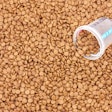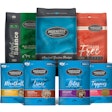APHIS GUIDELINES FOR EXPORTERS
Originally Presented: October 17,
2007
Joyce Bowling-Heyward, DVM, MS
Assistant Director
Export Animal Products Staff
USDA/APHIS/VS
Goals
Understand the APHIS role in export
certification from start to finish
Understand exporter's role in export certification from start
to finish
Know how to access the appropriate resources to accomplish your
export certification with the minimal amount of
headaches
Acronyms
APHIS-Animal and Plant Health Inspection
Service
VS-Veterinary Services
FAS-Foreign Agriculture Service
IS-International Services
NCIE-National Center for Import and Export
IREGS-International Regulation Retrieval System
FDA-Food and Drug Administration
CVM-Center for Veterinary Medicine
EU-European Union
SECTION 1: APHIS ROLE
1. Our main role is to assist the exporter
in meeting the import requirements of the foreign country.
2. APHIS negotiates new or different export requirements with
foreign governments.
3. If an issue is outside of APHIS jurisdiction (such as
residues), APHIS will collaborate with another agency or
division.
4. We inspect exporting facilities if required by importing
country.
5. We maintain lists of approved facilities as needed and
provide this information to foreign governments.
6. We assist exporters when products are placed on hold
overseas.
7. We explain APHIS policies to foreign officials and the
general public.
8. Export requirements are posted on our web site provided
earlier. Some countries will change their import
requirements without notice so we do not guarantee that these
requirements are up to date!
9. Export certificates are signed by Area Offices in accordance
with APHIS policies
.
APHIS Trade Ban Web Sites
When certain diseases occur in the United
States, such as Avian Influenza, foreign countries will suspend
the import of certain products from part, or all of the
U.S. Because these actions may be temporary and occur in
rapid succession, this information is not always available on
the IREGS. APHIS will post a web site that is updated
daily to inform exporters and VS field personnel of bans in
effect. At this time there are no active trade ban web
sites. All current information should have been posted to
the APHIS IREGS or the FSIS export library. In the unfortunate
event that we have another disease outbreak, we will start the
procedure again if needed.
Regional Import/Export Coordinators
- Coordinators provide training
and day to day assistance to Area Offices.
- They help improve consistency between Area Offices.
- This has enabled NCIE staff to focus on
negotiations and policy issues.
Area Office Inconsistencies
1. If you have a concern that area offices
are using different procedures, you should contact Regional
Import/Export Coordinator.
2. If you have a concern that an area office is not following a
proper procedure (for instance, you have been told that a
product cannot be exported, but you know that is incorrect),
contact NCIE.
SECTION 2: EXPORTER'S ROLE
It is the exporter's responsibility to make sure they are using
the most current export requirements.
Finding The Requirements
Mechanisms to obtain export requirements:
1. Importer requests import permit from government
2. Check NCIE IREGS
3. Contact FAS foreign service offices
4. Contact APHIS, IS foreign service offices
Unsuccessful Search
If you are unsuccessful in obtaining
import requirements, or if country is unspecific about what
is required after exhausting these sources, your options are:
1. Ship with no certification. Some countries may
have no requirements (although the number of these countries
is quickly disappearing).
2. Offer a certificate that would be used for another
country (the less detailed, the better), or a certificate of
free sale.
3. NCIE can enter into formal negotiations to see what
the country will accept.
Shipping At Your Own Risk
If you have information (but not in
writing) that a foreign country will accept documentation
different from that provided on the IREGS, you may ship at
your own risk IF:
1. The foreign country has not told APHIS that the product is
prohibited, and
2. You are willing to sign a statement indicating that you
are willing to ship at your own risk.
Sample Statement (for shipping at
your own risk)
I have been advised by APHIS that this
shipment of _______does not meet with the Agency's
understanding of (name of country) import requirements for
this commodity. As a result, I understand that this
shipment may be refused entry, destroyed, and/or returned to
the United States. If such a situation does occur, I
understand that APHIS may not be able to provide assistance
in getting the shipment released. I understand that if
APHIS signs the export certificate for this commodity, I am
shipping at my own risk.
Obtaining the Proper Export
Certificate
- VS Form 16-4
- Letterhead certificate
- Proper use of affidavits
- Certificate of free sale issued by FDA/CVM
User Fees
- APHIS currently charges a user fee
for export certification and/or inspection
- Fees are found in Title 9, Code of Federal
Regulations, Part 130
- Current fee for export certificate is $32
- Contact for user fee account questions:1-877-777-2128
General Requirements
Export certificates must be in
English. If a bilingual certificate is
required, it is the exporter's responsibility to
have the certificate translated. Translations
should be line by line or paragraph by
paragraph. They should NOT be two separate
certificates. If APHIS already has a bilingual
version of a certificate, it will be available on
the IREGS.
Certificates must be typed. Products listed on a
certificate must be exported from a port in the
United States.
Many countries (including EU countries) require
export certificates to be endorsed prior to the
date of export. APHIS will date a
certificate using the current date.
Certificates may not be predated or postdated.
Certificates may NOT be altered after they are
signed and sealed. We will discuss
obtaining amended certificates later in this
presentation.
One export certificate per shipment. Cannot
have a 16-4 AND a letterhead certificate for the
same shipment. This does not apply to
different documents such as SRM statements. These
additional documents are numbered and signed as
part of the original export certificate.
How APHIS Evaluates Certification
Statements
APHIS officials may not sign statements
about genetically modified organisms unless they are provided
on the IREGS.
Any certificate that indicates that a product has been tested
may not be endorsed until the test results have been
verified. If a negative result is cited or a product is
said to be "free" of something, lab results are needed.
Test results must clearly support the statement listed on the
certificate and relate to the lot of material being
certified.
Lab Results
- Test results may be in the direct
attestation or in the affidavit section of the certificate.
- General statements such as, "materials are not likely
to contain harmful levels…" may be supported by affidavit
without including test results.
Certification Statements
Some statements can be made as direct
attestations without additional documentation or verification
by inspection:
1. Statements about the animal health status of the US or a
region
2. Statements that refer to APHIS regulations
3. General statements about products being produced under
rules and regulations of the US.
4. Statements that products are fit for animal consumption.
Circumstances under which APHIS can endorse statements that a
facility was inspected and approved:
1. APHIS has inspected and approved the facility
2. Facility can prove in writing that it has been approved by
another government agency (affidavit not sufficient)
Statements that a product meets
regulations of another agency or authority must be signed
by that authority.
For example: a statement that a product meets all FDA
regulations must be signed by FDA.
Rarely will APHIS sign a statement that "animals used to
produce a product were born and raised in the United
States" or "the animals were of US origin." Due to
imported animals it is difficult to make this statement.
We can certify that a product is of US origin if it
was made in the United States.
Which Area Office Can Sign My
Certificate?
You may go to an Area Office in a state
where:
- The product was manufactured or produced
- The product was shipped/exported
- The product was processed
- The broker or shipper is located.
When Are Inspections Required?
- If a statement on an export
certificate is not based on an affidavit, it must be
confirmed by inspection
- If the importing country requires the exporting
facility to be inspected prior to export
- If the AVIC or signing official is not comfortable
signing the document without an inspection
European Union Inspections
Many facilities must be inspected and
approved to meet EU import requirements
INSPECTION DATE: The date the facility was physically
inspected.
APPROVAL DATE: The date the facility was actually
approved as meeting all the requirements.
Facility must be reinspected one year from inspection date.
EU Inspections
Confusion has been generated because
facilities are not aware of both dates. Area offices
have this information, make sure you are aware of both dates.
In order to prevent lapses in approval, you should start the
reapproval process approximately 2 months before the
anniversary of your INSPECTION DATE. APHIS prepared web
based training for our field people regarding the EU
inspection and approval process. We will be updating
the course during the next year to provide information on
changes to EU regulations.
VS FORM 16-4
This is the generic export certificate for
animal products.
ONLY used for products that contain animal origin
ingredients.
Contains animal health statements about the United States,
and a blank area to add additional declarations.
Some countries will not accept this form.
Electronic Versions of 16-4
At this time, exporters can generate their
own electronic version of a 16-4, but it must be an exact
copy (colors, font sizes, etc).
Not all countries will accept electronic versions.
Instructions for VS Form 16-4
The text in the "additional declarations" section should not
be spaced to allow the addition of information after the
certificate is endorsed. No text should appear over the
USDA seal.
The document must be typed. Information must be in English,
bilingual documents are acceptable.
In the box for product quantity and type,
enough information must be provided to identify the animal
species of origin.
Information on the animal health status of the United States
or any other direct attestation should precede any additional
statements supported by affidavit.
Statements supported by affidavit should be placed below the
affidavit line, "This office has on file a notarized
affidavit from [company name] verifying the accuracy of the
statements below."
Affidavit Format
- Must be made on company letterhead
- Must be endorsed by a person in a position of
authority within the company, and should explain the signer's
position or qualifications to make the statements.
- Must contain the information that the exporting
company wishes to have included on it's export certificate
- The statement, "I certify that the statements listed
above are true to the best of my knowledge and belief" must
appear at the end of the affidavit above the signature.
- The name and title of the signing official must be
typed under his/her name.
- The affidavit must be notarized and renewed at least
once a year.
More on affidavits
If the exporter is not the producer or
manufacturer of a product, the affidavit provided may be from
the producer or manufacturer. The affidavit line on the
export certificate will reference the producer.
If the exporter does not want the producer name to show up on
the export certificate, they must provide a two part
affidavit.
Improper Use of Affidavit
An affidavit may NOT be used for
1. Animal health statements
2. Anything requiring a test result
Area Offices will not sign obviously untrue statements, even
on the basis of an affidavit.
Letterhead Certificates
Used for countries that do not accept a VS
Form 16-4 or for exports that are NOT of animal origin
in the following circumstances:
1. Certification is required about the animal health status
of the United States, or
2. Certification is required that the product does not
contain any animal origin ingredient
The certificate should be printed on Area Office
stationery.
Exporter should complete the letterhead
certificate and submit it to the area office. If the
certificate has multiple options (such as for processing),
incorrect options should have a line drawn through them. They
should not be deleted from the certificate. The area office
will copy it onto their letterhead, add certificate number,
sign and seal.
Last Minute Information
- Items such as weight, port,
container number, seal number
- Submit certificate to area office without this
information so that they can review certificate
- Call Area Office with additional information that
needs to be added
- Area Office can add information and finalize
certificate
- Area offices have been authorized to date export
certificates with the date that they are received in their
office.
- Offices will usually complete certificates in 24-48
hours. Occasionally this may be delayed due to workload
or movement of personnel.

















